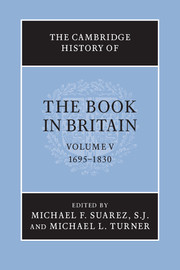Book contents
- Frontmatter
- Introduction
- PART I THE QUANTITY AND NATURE OF PRINTED MATTER
- PART II ECONOMIC, LEGAL AND CULTURAL CONTEXTS
- PART III THE TECHNOLOGIES AND AESTHETICS OF BOOK PRODUCTION
- PART IV THE BOOK TRADE AND ITS MARKETS
- V BOOKS AND THEIR READERS
- I RELIGIOUS BOOKS
- II LITERATURE AND THE CULTURE OF LETTERS
- III SPECIALIST BOOKS AND MARKETS
- 38 Collecting and the antiquarian book trade
- 39 The Stationers’ Company and the almanack trade
- 40 Children’s books and school-books
- 41 Music
- 42 Maps, charts and atlases in Britain, 1690–1830
- 43 Enlarging the prospects of happiness: travel reading and travel writing
- 44 Law books
- 45 Philosophical books
- 46 Scientific and medical books, 1695–1780
- 47 Scientific and medical books, 1780–1830
- 48 ‘Radical publishing’
- 49 Mining the archive: a guide to present and future book-historical research resources
- Abbreviations used in bibliography
- Bibliography
- Index
- Frontispiece
- Plate section
- References
47 - Scientific and medical books, 1780–1830
from III - SPECIALIST BOOKS AND MARKETS
Published online by Cambridge University Press: 28 September 2010
- Frontmatter
- Introduction
- PART I THE QUANTITY AND NATURE OF PRINTED MATTER
- PART II ECONOMIC, LEGAL AND CULTURAL CONTEXTS
- PART III THE TECHNOLOGIES AND AESTHETICS OF BOOK PRODUCTION
- PART IV THE BOOK TRADE AND ITS MARKETS
- V BOOKS AND THEIR READERS
- I RELIGIOUS BOOKS
- II LITERATURE AND THE CULTURE OF LETTERS
- III SPECIALIST BOOKS AND MARKETS
- 38 Collecting and the antiquarian book trade
- 39 The Stationers’ Company and the almanack trade
- 40 Children’s books and school-books
- 41 Music
- 42 Maps, charts and atlases in Britain, 1690–1830
- 43 Enlarging the prospects of happiness: travel reading and travel writing
- 44 Law books
- 45 Philosophical books
- 46 Scientific and medical books, 1695–1780
- 47 Scientific and medical books, 1780–1830
- 48 ‘Radical publishing’
- 49 Mining the archive: a guide to present and future book-historical research resources
- Abbreviations used in bibliography
- Bibliography
- Index
- Frontispiece
- Plate section
- References
Summary
The stirring up of the mind which took place during the French Revolution … gave rise to the demand for more numerous and various publications, as well as for a superior quality in their character and contents … Many more thought and read than formerly; and their thoughts were of a more original cast and bearing.
Blackwood’s Edinburgh Magazine (1824)You begin … with the attempt to popularize science: but you will only effect its plebification. It is folly to think of making all, or the many, philosophers, or even men of science and systematic knowledge.
S.T. Coleridge (1830)The book trade of the late eighteenth and early nineteenth centuries underwent a massive expansion and diversification of its products. This was due in part to increasing commercialization following the ruling against perpetual copyright in 1774 and to the incremental introduction of mechanization after 1800. In addition, a rapid rise occurred in both literacy and reading, owing to such social and cultural changes as population growth, urbanization and the extension of elementary education. Consequently, new class-conscious reading audiences were formed. These transformations in print culture were accompanied by a related transformation in the natural and medical sciences. The natural sciences became increasingly divided into specialist disciplines, each with its own small cohort of expert practitioners who were increasingly separated from a wider, fragmenting public. Similarly, scientific societies proliferated, catering for local or specialist constituencies. Many existing fields, like chemistry and geology, were transformed by significant innovations, and new sciences, such as electro-chemistry, were introduced. At the same time, novel organizations such as the Science (founded 1831) were established to convey developments to wider audiences. A new word, ‘scientist’, was devised to describe the emerging specialists (although it was not widely used until later in the century) and a new notion of ‘popularization’ was used to describe their relationship with the proliferating audiences for science. These rapid developments were reflected in the very considerable changes which occurred in scientific and medical publications, ranging from the expansion of specialist scientific periodicals to the emergence of new genres of ‘popular science’ publishing for nonspecialist audiences.
- Type
- Chapter
- Information
- The Cambridge History of the Book in Britain , pp. 827 - 833Publisher: Cambridge University PressPrint publication year: 2009
References
- 3
- Cited by

